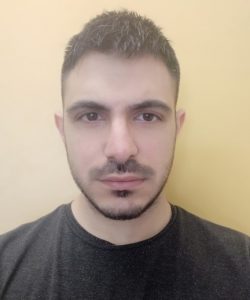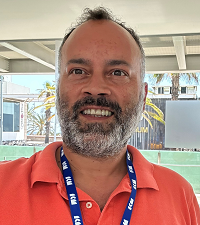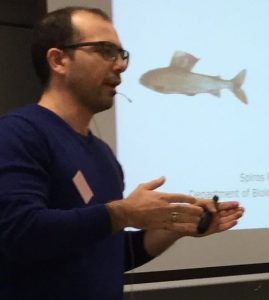Jorge Fernandes
Professor in Genomics and Molecular Biology, Nord University (Norway) and Institute of Marine Sciences (Spain)
I have over 20 years’ experience in Aquaculture Genomics. My current research fields are muscle growth and innate immunity in teleosts, with focus on the epigenetic regulation (DNA methylation and non-coding RNAs) of gene networks by environmental factors in commercially important species, such as Nile tilapia and Atlantic cod.
Elena Sarropoulou

Research Director, Hellenic Centre for Marine Research
Dr. Elena Sarropoulou a Research Director at the Institute of Marine Biology, Biotechnology and Aquaculture (IMBBC) of the Hellenic Centre for Marine Research. Her main research activities concern teleost development, stress and disease response, and reproduction applying state-of-the-art -omics technologies. (sarris@hcmr.gr)
Diego Robledo

Roslin Fellow, The University of Edinburgh and University of Santiago de Compostela
Diego Robledo is a group leader at the Roslin Institute (University of Edinburgh) and the University of Santiago de Compostela. Diego studied biology as an undergraduate at the University of Santiago de Compostela, where he also completed his PhD in genetics, specifically studying sex determination in turbot (Scopthalmus maximus). In 2016, Diego moved to the Roslin Institute as a postdoctoral researcher, and he became a group leader there in 2019. After securing an ERC Starting Grant in 2022, Diego became also a group leader at the University of Santiago de Compostela, and currently he splits his time between both Universities. The main interest of Diego´s research group is to understand infectious processes in aquatic animals, and especially differences in disease resistance between individuals, populations or species, applying this knowledge to improve the resistance to diseases of aquaculture stocks. To do so, his research group employs a broad range of genetic and genomic approaches, including the development of new genome assemblies and genotyping arrays, genome-wide association and genomic selection approaches, (single-cell) transcriptomic and epigenomic technologies, and genome editing using CRISPR-Cas systems. This ample repertoire allows tackling research questions from different angles. (Diego.Robledo@roslin.ed.ac.uk)
Efthimia (Efi) Antonopoulou
Professor, School of Biology, Aristotle University of Thessaloniki
Dr. Efthimia (Efi) Antonopoulou is professor in Animal Physiology with emphasis on Fishes. Her main research activities concern reproductive biology, nutrition and gut microbiome, and functional genomics.
Alexandros Triantafyllidis

Professor, School of Biology, Aristotle University of Thessaloniki
Biologist with PhD studies on “Population genetics of animal organisms”. Member of Aristotle University of Thessaloniki, Greece since 2003. I have followed sabbatical studies on bioinformatics in Katholieke Universitet Leuven (2010) and University of Oxford (2019). I have collaborated with Greek and European researchers in National and EU projects on food traceability of aquaculture speacies and their products as well as biodiversity conservation of Greek animal species using genetic and genomic tools. I have been a member of School of Biology and Aristotle University Committees on Programmes of Studies, Evaluation, Accreditation, Erasmus, ECTS and international mobility and affairs. Apart from my research interests, I’m also involved in projects related to the Social Responsibility of Universities such as “INSPIREUROPE+-Initiative To Support, Promote, And Integrate Researchers@Risk In Europe” (H2020-MSCA-funded). (atriant@bio.auth.gr)
Spiros Papakostas
Assistant Professor, Department of Science and Technology, International Hellenic University
Dr. Spiros Papakostas is an Assistant Professor of Microbial and Molecular Ecology in the Department of Science and Technology at the International Hellenic University. His research and teaching encompass the application of next-generation sequencing technologies, including genomics, transcriptomics, and epigenomics, as well as proteomics. He employs these cutting-edge tools to unravel the molecular mechanisms underlying adaptation and the eco-evolutionary dynamics of organisms in response to their environment. A significant focus of his research is on teleost fish of high importance in aquaculture, such as Gilthead Seabream, European Seabass, and various salmonid species. (spapakostas@ihu.edu.gr)
Ioannis Kavakiotis

Post Doc Researcher, Department of Science and Technology, International Hellenic University
Ioannis Kavakiotis is post doc researcher in International Hellenic University and his research interests are focused in Machine Learning and Artificial Intelligence methods specialized for Biological and Biomedical data. During his research career he has worked in several European and/or national funded scientific projects. (ikavakiotis@gmail.com)
Elisavet Kaitetzidou

Post Doc Researcher, School of Biology, Aristotle University of Thessaloniki
Dr Elisavet Kaitetzidou’s main interest is the understanding of the expression and transcriptional regulation processes of teleost genes/genomes and their phenotypic signature. Today, her research focuses on the study of epigenetic mechanisms linking to embryogenesis, reproduction, immune resistance, and metabolism in farmed fish.Dr Elisavet Kaitetzidou’s main interest is the understanding of the expression and transcriptional regulation processes of teleost genes/genomes and their phenotypic signature. Today, her research focuses on the study of epigenetic mechanisms linking to embryogenesis, reproduction, immune resistance, and metabolism in farmed fish. (ekaitetz@gmail.com)
Nikolas Panteli

Department of Biology, Aristotle University of Thessaloniki
Mr. Nikolas Panteli is a postdoctoral researcher in the Laboratory of Animal Physiology, Department of Biology of the Aristotle University of Thessaloniki, with master’s degree specialization in the field of Hydrobiology and Aquaculture. His research interests include animal physiology and microbial ecology and the subject of his PhD dissertation was the impact of insect meals on gut microbial communities and physiology of fish. He has published papers in peer reviewed journals indexed in Scopus database and part of his research has been presented in numerous national and international conferences. (nkpanteli@bio.auth.gr).




